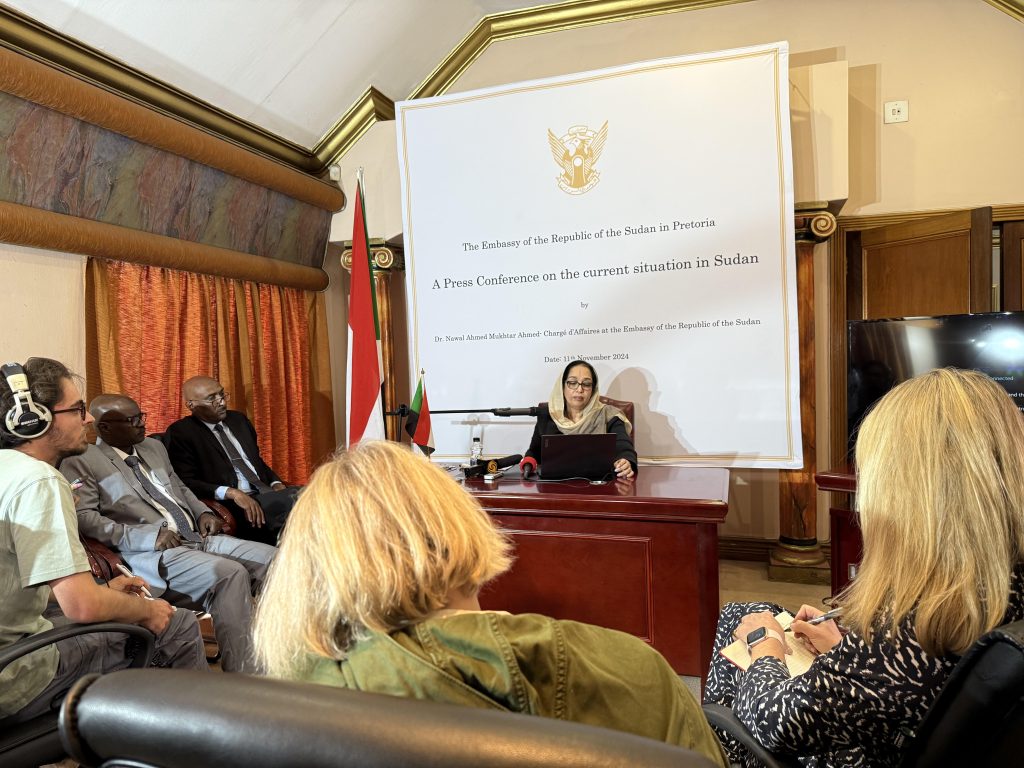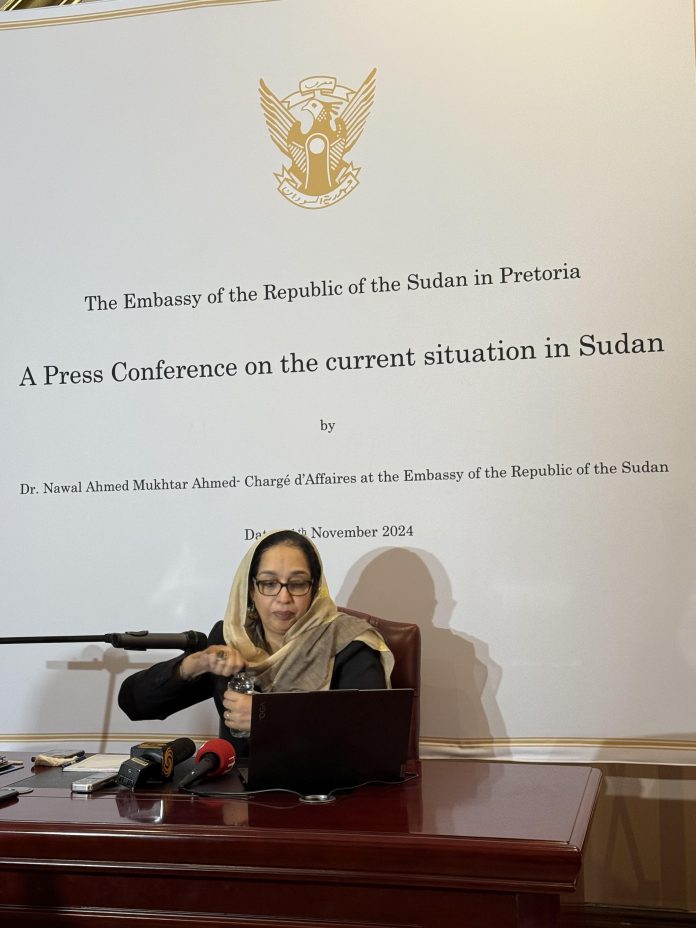Diplomatic Inside
JOHANNESBURG, SOUTH AFRICA – Dr. Nawal Ahmed Mukhtar Ahmed, the Sudanese Charge d’Affaires in Pretoria, stated that Sudan is facing its worst humanitarian crisis yet, with no official ceasefire currently in place. Addressing the media at a press conference on Monday at the Sudanese Embassy, Dr. Ahmed called on the global community and the South African government to support Sudan’s transitional government in ending the oppression and violence inflicted by the Rapid Support Forces (RSF).

Dr. Nawal Ahmed Mukhtar Ahmed, Sudanese Charge d’Affaires in Pretoria, addresses the media at a press conference at the Sudanese Embassy in South Africa on 11 November 2024.
Citing verified reports, including a January 15, 2024, U.N. Security Council Panel of Experts report, Dr. Ahmed highlighted the involvement of regional powers in supporting the RSF militia, specifically mentioning the UAE. However, she also noted that Saudi Arabia and Egypt are assisting the Sudanese government in efforts to resolve the ongoing conflict and restore peace.
“Sudan has been going through a very difficult transitional period since 2019, almost five years of grappling with political unrest and, more recently, armed conflict,” Dr. Ahmed said. “The roots of this crisis stem from a combination of historical challenges, including colonial legacies, political struggles, climate impacts, and the pressures of regional and global tensions.”
The Sudanese diplomat explained that after the 2019 ousting of Sudan’s previous regime, the transitional government was structured around a power-sharing agreement between military generals and civilian leaders. This arrangement was intended to navigate Sudan toward stability and democracy, yet it created multiple, sometimes contradictory challenges. “The transitional government faced numerous, and at times overwhelming, tasks,” Dr. Ahmed said, listing the need for security reforms, economic restructuring, and justice and reconciliation as pivotal issues. Furthermore, she noted the transitional administration’s struggle to balance external regional influences from the previous regime and fulfill the public’s expectations following the December 2018 revolution.
However, one of the most contentious issues, and ultimately a direct cause of the war, was the unresolved question of the RSF’s integration into Sudan’s national army. “National armies are recognized as the sole legitimate authorities with the right to use force in their countries,” she asserted. “The failure to integrate the RSF into the national military ultimately led to armed confrontation on April 15, 2023, which has since devastated the nation.”
According to Dr. Ahmed, the ongoing conflict has had catastrophic humanitarian consequences. Reports from the United Nations indicate that nearly half of Sudan’s population urgently requires assistance. The death toll has reached staggering levels, and almost 11 million people have been displaced. Over 12.2 million have sought refuge in neighboring countries as families are torn from their homes and livelihoods by relentless RSF attacks.
The Charge d’Affaires also pointed to a disturbing expansion of violence reminiscent of the atrocities committed by the Janjaweed militia in Darfur two decades ago, only this time spreading further across the country. She said the RSF has continued its campaigns of violence in areas such as Al Gezira State, where massacres and village displacements have intensified since October 20. “By now, around 200 villages in central-eastern Sudan have been displaced, with an estimated 600 people currently forced out and more still in motion,” she said, lamenting the tragic cycle of attacks.
The humanitarian impact of these hostilities extends beyond Al Gazira State, she added, describing similar situations in North Darfur, where the RSF has ignored United Nations Resolution 2736. This resolution, issued on June 13, 2024, demands that the RSF end its siege on El Fasher. Dr. Ahmed confirmed that despite these calls for restraint, residential areas and medical facilities in Khartoum and other cities remain under relentless artillery fire.
“Khartoum, Omdurman, Bahri, Al Geneina in West Darfur, Wad Madani in central Sudan, Kordofan, the White Nile, Sinja, and Sinnab in the southeast, these are all areas where killings and attacks are taking place daily,” Dr. Ahmed explained. The extent and frequency of the violence have left Sudanese civilians traumatized and deeply fearful for their lives.
Appealing to the global community, Dr. Ahmed implored international stakeholders to offer their assistance to end the crisis. “This can only be achievable through global community solidarity and genuine commitment to peace and enabling of comprehensive dialogue between all Sudanese stakeholders and their ownership of the solution with a steadfast principled effort to uphold justice, human rights, and freedom.”
“Sudan welcomes all serious initiatives to restore peace and stability in the country. The Jeddah Declaration, signed in May 2023, remains the only binding and practical framework so far for addressing humanitarian issues and protecting civilians,” said Dr. Ahmed.
“The Ministry of Foreign Affairs, the Ministry of Interior, and other relevant authorities are all coordinating to facilitate the access of humanitarian assistance entering Sudan by air, road, or sea. From January 1st to November 6th, 2024, the Humanitarian Aid Commission issued 12,179 cross-border movement permits to humanitarian organizations and agencies, allowed 1,073 trucks through various crossings, and facilitated the movement of 10,705 trucks across internal routes. Additionally, the commission issued 2,985 entry visas for international humanitarian workers.”
Before taking questions, Dr. Ahmed presented a short video documenting the severe violations committed by the RSF militia, some of which were even captured on their own cameras. She apologized for the sensitive content included in the video.
When asked about the recent meeting between Sudan’s Vice President and South Africa’s Foreign Affairs Minister, Dr. Ahmed described it as “a good meeting.” She shared, “The Vice President gave the Minister an overview of what’s happening in the country, and the way forward, the vision for peace, or the perspective of the Sudanese people. The meeting has also discussed bilateral relations, and also support in multilateral fora. So, I guess it was a good meeting…a start for the Ministry of Foreign Affairs to learn more about, in this new era…to learn more about the crisis in Sudan.”
Dr. Ahmed acknowledged South Africa’s early response to Sudan’s crisis, noting, “Since the start of the crisis, in April 15th, His Excellency, President Ramaphosa, was one of the first African leaders, who issued a statement expressing his deep concern about the unfolding situation in Sudan and calling for a return to the negotiating table.” Emphasizing Ramaphosa’s commitment, She added, “He has also voiced several times his support for the role of regional organizations in their mediation roles in Sudan, in line with the principle of Africa’s future solutions to African problems.”
Addressing the recent deployment of a UN panel to investigate war crimes, Dr. Ahmed clarified, “Regarding the question, I’m not very aware if there’s a delegation from the fact-finding mission, but I’m aware of a delegation from the Peace and Security Council.” She continued, “The government have established an investigation committee…they have issued two reports, and they have been submitted to the Human Rights Council…regarding crimes against humanity, and so I think some cases have been filed and there are some prosecutions.”
On the RSF’s actions, Dr. Ahmed expressed frustration, noting that Sudan seeks stronger condemnation from allies, including South Africa, over RSF’s recent attacks. “We would definitely want South Africa to have a more progressive role, to condemn the actions by the RSF, the massacres that are happening at the moment in areas in Al Gezira state… the siege of El Fasher and so on,” she said.
Dr. Ahmed also commented on Sudan’s potential return to negotiations, saying, “There’s no official negotiation going on now, but my information is there are talks… between the leadership of Sudan with regional organizations.” He mentioned that the African Union’s Peace and Security Council, which arrived in Port Sudan in October, has begun to take action, sharing, “The African Union is starting to get more insight about what’s going on in Sudan and to realize the concerns of the Sudanese government… it was recommended…during the visit to open an office for the African Union in Port Sudan to have more engagement with stakeholders.”
Dr. Ahmed emphasized Sudan’s complex role as both an African and Arab nation, noting, “I can’t say that Sudan is African or Arab. Sudan is all of that, and we have to accept this fact. This is our destiny, and these are our neighbors, and we need to deal with these issues.” Acknowledging the regional challenges, he continued, “Sudan has been struggling with a lot of engagement with other countries inherited from the previous regime. And this needs time to be sorted out.”
Dr. Ahmed also addressed recent tensions within the African Union, such as Sudan’s decision not to attend Thabo Mbeki’s Peace and Security Conference due to the RSF’s involvement. “It was the stance of the government…there was no delegation to have any discussions or meeting with the RSF. So it’s a government position, there’s nothing obliging anybody. It’s our right to have our position regarding any participation in any conference.”
In closing, Dr. Ahmed spoke of the resilience of the Sudanese people and appealed for greater international awareness. “The Sudanese people are always hopeful. We have endured a lot, and we will endure this with the help of the international community and you as journalists who seek to reflect whatever is happening, and we rely on you,” she said.
“As Sudan faces an uncertain path, the country remains hopeful that international support and coordinated regional efforts will bring it closer to peace and stability.”
The country’s two rival generals, Abdel Fattah al-Burhan and Mohamed Hamdan Dagalo (known as Hemedti), continue to clash despite multiple failed ceasefire attempts. Burhan, who first came to power in 2019 following the ousting of dictator Omar al-Bashir and solidified his position in a 2021 coup, is battling Hemedti, leader of the paramilitary Rapid Support Forces (RSF). The two had previously cooperated under Bashir, with Hemedti leading the RSF in Darfur, but their relationship soured as they disagreed overpower and the integration of the RSF into Sudan’s national military.


